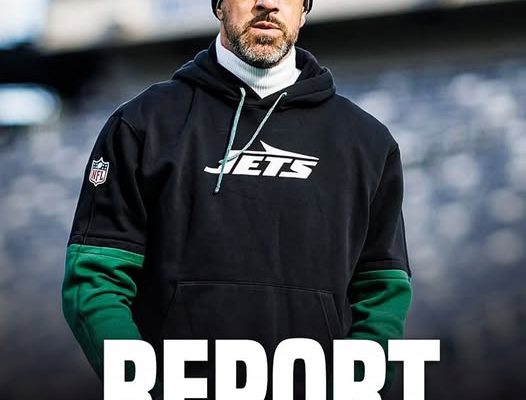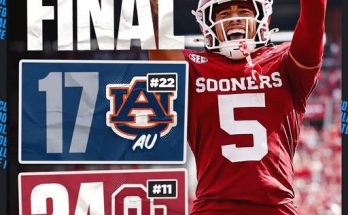The New York Jets have never been a franchise short on drama, and the latest twist in the Aaron Rodgers saga might be one of the most eye-catching developments yet. Reports have emerged suggesting that the organization has privately informed the veteran quarterback that continued appearances on “The Pat McAfee Show,” a platform he has used frequently and unapologetically to voice his opinions, would no longer be tolerated if he intends to return to the team next season. This condition, although not yet officially confirmed by either party, has sent waves through the NFL community and re-ignited the national conversation about Rodgers’ influence, media habits, and the fine balance of player freedom within team structures.
Aaron Rodgers has long been one of the NFL’s most fascinating and polarizing figures. From his precision on the field to his unpredictability off it, Rodgers has built a career that’s equal parts brilliant and controversial. His appearances on “The Pat McAfee Show” over the last few years have only reinforced that image. On the show, he’s talked candidly about vaccines, “woke” culture, UFOs, psychedelics, political ideologies, NFL conspiracies, and more, all with a mix of sarcasm, deep thought, and philosophical musings. These appearances became weekly fixtures for NFL fans—something between a podcast, a press conference, and a therapy session where Rodgers offered unfiltered access to the inner workings of his mind. The Pat McAfee platform gave Rodgers what few athletes have ever had: a consistent and popular outlet that bypasses traditional media filters, letting him control the message.
But while fans and critics alike tuned in weekly to hear Rodgers’ take on everything from his Achilles rehab to global issues, there’s growing evidence that the New York Jets’ brass grew increasingly uncomfortable with the level of attention and potential distraction the appearances brought. It’s not difficult to imagine how this tension reached a boiling point behind closed doors. In a market as unforgiving and intense as New York, everything is magnified—every quote, every tweet, every podcast clip. And when Rodgers’ statements crossed the line into territory the team perceived as damaging or irrelevant to football, the tolerance meter seemingly began to run out.
Rodgers, after all, wasn’t just doing sports commentary. His McAfee segments occasionally veered into confrontational waters, especially regarding his views on science and government, or when targeting NFL commentators, league decisions, and even teammates. This created unnecessary waves for a Jets organization that already had its hands full dealing with a disappointing 2024 season, plagued by Rodgers’ injury, Zach Wilson’s inconsistencies, and the seemingly cursed aura surrounding their offense. Team officials were reportedly caught off-guard multiple times by statements Rodgers made on the show—statements that led to a media firestorm and forced the franchise to spend time doing damage control that could have been spent planning for game day or fostering locker room unity.
The reported ultimatum—that Rodgers must stop appearing on “The Pat McAfee Show” if he wants to remain with the Jets—marks a fascinating and potentially defining moment in the team’s relationship with its most high-profile player. For an NFL franchise to make such a demand of its star quarterback is rare, even borderline unprecedented. It suggests a shift in the power dynamic between the Jets and Rodgers—one that indicates the team is no longer willing to accept the circus that has surrounded him over the past few years, especially now that the honeymoon phase has long expired.
It’s also a tacit acknowledgment of how much the McAfee platform has become synonymous with Rodgers’ public identity. In the eyes of many fans, Rodgers without his Tuesday interviews on McAfee is like Brady without Belichick or Manning without the hurry-up offense—almost unthinkable. His chemistry with McAfee and former linebacker A.J. Hawk has made for some of the most entertaining sports content in recent memory. Rodgers has come across as funny, vulnerable, intelligent, smug, and stubborn—often all within a single segment. Yet as entertaining as that might be, it hasn’t always aligned with the goals or image of the New York Jets.
The conflict also reveals deeper questions about athlete autonomy in the modern media age. Rodgers isn’t the first high-profile athlete to have a media outlet, but his case is unique because of the sheer consistency and reach of his appearances. Most athletes carefully curate what they say and when they say it. Rodgers, on the other hand, turned his guest spot on a sports show into a quasi-weekly town hall on whatever issue he deemed important, whether it pertained to football or not. That freedom came with consequences, and now the Jets are pushing back—perhaps too late, but with conviction nonetheless.
The timing of this alleged demand is also critical. With training camp on the horizon and Rodgers coming off a major Achilles injury, the Jets need full cohesion, focus, and accountability. The stakes for 2025 could not be higher. The team’s defense is elite, its skill positions are loaded, and the window to contend is open but closing fast. Having Rodgers return and lead a divided or distracted locker room could doom the season before it even begins. From the Jets’ perspective, eliminating the McAfee show from Rodgers’ schedule isn’t about silencing his voice—it’s about prioritizing football and removing unnecessary distractions. They see this as a leadership issue, not a censorship debate.
Rodgers, however, may see things differently. This is a quarterback who has spoken at length about personal freedom, about challenging authority, about thinking independently. Being told what he can and cannot do, particularly when it comes to speaking freely, could easily rub him the wrong way. And if history is any indication, he’s not the type to simply fall in line without pushback. There’s a chance this request could backfire—alienating Rodgers or even pushing him to retire, demand a trade, or escalate tensions with the front office.
There’s also the McAfee angle to consider. Pat McAfee, who now works under the ESPN umbrella, has made no secret of his admiration for Rodgers and the value the quarterback brings to his show. Losing Rodgers as a recurring guest would be a significant blow to the show’s identity and its ratings. While McAfee has a roster of entertaining voices, none have the combination of charisma, controversy, and cachet that Rodgers brings. Rodgers not appearing on the show could mark the end of an era in sports talk media. It’s hard to understate how big a deal his presence has been—not just for McAfee but for reshaping how athletes engage with the media ecosystem.
Public reaction to the report has been predictably split. Some fans support the Jets’ position, arguing that Rodgers needs to prioritize football and act like a leader, not a podcast celebrity. Others see the alleged restriction as petty and controlling, claiming it stifles free speech and penalizes a player for being honest and authentic. Even among former players and analysts, there’s little consensus. Some believe that Rodgers’ weekly performances on McAfee created unnecessary distractions; others contend that grown men in a professional locker room should be able to handle their quarterback having opinions, even controversial ones.
The reality is likely somewhere in the middle. Rodgers’ weekly spots were both a source of insight and chaos. They pulled back the curtain on the mental and emotional world of an elite quarterback, but they also created side stories that frequently overshadowed the games themselves. As Rodgers returns from injury and aims to make one final run at a Super Bowl with the Jets, perhaps both parties have realized that the football has to come first—and that clarity of purpose may demand sacrifices, even ones that affect image and ego.
Whether Rodgers will accept this condition remains to be seen. For a man who has spent the past few years defiantly blazing his own trail, this may be the first true crossroads where he has to choose between personal expression and team allegiance. The Jets are gambling that he will prioritize the latter. If he doesn’t, the implications could be massive—not just for his future in New York, but for how NFL stars navigate media in an age where personal platforms rival the NFL itself in reach and influence.
For now, fans can only wait and watch. Will Rodgers say goodbye to the mic in exchange for one last shot at gridiron glory? Or will he walk away from the Jets to preserve his voice and platform? The next chapter in this saga promises to be as dramatic and defining as anything we’ve seen so far. One thing is certain—when it comes to Aaron Rodgers, nothing is ever simple, and nothing is ever quiet.



